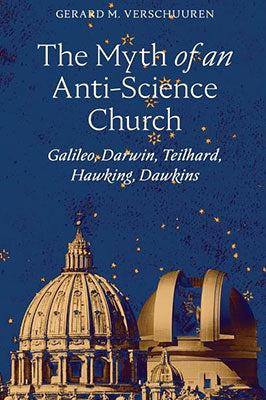
The Myth of an Anti-Science Church
U.S. Delivery in 3-9 business days.

Galileo, Darwin, Teilhard, Hawking, Dawkins
In this outstanding work, geneticist and philosopher of science Gerard Verschuuren responds to the popular myth that the Catholic Church is “anti-science.” Clearly distinguishing between research and ideology, he probes the scientific discoveries and the non-scientific convictions of five major (and controversial) figures: Galileo Galilei, Charles Darwin, Pierre Teilhard de Chardin, Stephen Hawking, and Richard Dawkins. His well-researched analysis and precise conclusions show that whereas the Catholic Church stood in substantial agreement with the scientific discoveries of each, it had good reason to disagree with their unsubstantiated and frequently self-refutational ideological assertions.
This book will prove an invaluable resource for those confused by the cultural myth of an “anti-science Church,” as also for high school and university students seeking the truth about science, philosophy, and faith—which are shown to dovetail felicitously when understood through the methodological lens appropriate to each. (FR. ROBERT SPITZER, from the Foreword)
“Does the Catholic Church ‘have a problem’ with the ideas of scientists? Sometimes. But as Gerard Verschuuren shows, not every idea of a scientist is a scientific idea. In this highly readable book, he meticulously dissects the ideas of five well-known scientists, separating the scientific wheat from the ideological chaff—illustrating his points with telling quotes, flashes of wit, and rhetorical force.”—STEPHEN M. BARR, professor of theoretical particle physics, University of Delaware
“This book provides an enjoyable, engaging journey through five major apparent conflicts between science and the Catholic Church—laying bare how the commonly accepted clashes are the stuff of myth. Two bonuses of the book are its lucid discussions of complex scientific and philosophical ideas, and a closing chapter presenting a positive vision of how science and religion should interact with each other.”—MICHAEL DENNIN, professor of physics and astronomy, University of California at Irvine